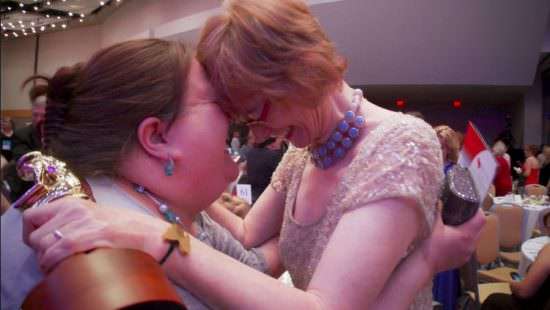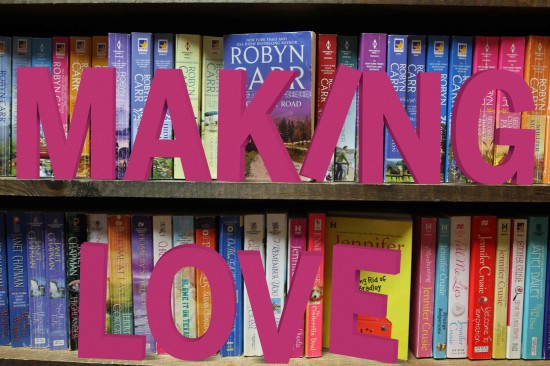As a long-time romance reader, I’m used to the shame that’s often associated with romance novels. I’ve hidden the covers of my books behind brown paper, snuck romances out of the library with the covers facedown, and been teased by classmates when they found a romance novel in my backpack in high school. I always knew I loved romance, but I also knew it was something I needed to hide.
But why is romance so often dismissed? It’s a question that filmmaker Laurie Kahn sets out to answer in her new documentary, Love Between the Covers. She spent three years following various people in the romance novel industry, from publishing giants to aspiring authors. The film explores what it means to write romance, how the community works together and why exactly there’s shame attached to the bestselling genre in all of publishing. Check out the trailer for more info—and to drool over the huge names that Kahn was able to interview (like Nora Roberts!):
We were lucky enough to speak with Kahn about romance, her previous work and what it means to be part of an often-overlooked community of women:
BookTrib: What made you decide to do a documentary about romance novels?
Laurie Kahn: I have been making films about women’s lives ever since I became an independent filmmaker in the 1990s. I don’t think there are enough stories about women up on the screen, and there are so many fabulous true stories about women. These really large communities of women who nobody takes seriously are like a magnet for me.
The romance community is unlike any other I’ve seen. The authors in this world really get to know their readers. It’s not just marketing—they actually develop relationships, go on trips with their readers, and help their readers become writers themselves. It’s a highly unusual community and I think has a lot to teach all of us.
BT: Are you a romance novel reader?
LK: I was when I was in junior high school; I read a lot of Victoria Holt and Elizabeth Goudge. I hadn’t been a romance reader [since], but to jump into this project, I’ve read hundreds. I read across the whole spectrum, from Amish and Evangelical all the way to BDSM.
BT: Why do you think romance novels don’t receive the same kind of recognition that other genres do?
LK: On one level it’s obvious: some people think they’re trash. But why? I spoke to many people who told me that complete strangers will walk up to them on a beach or a train and say, “Why do you read that trash?” They would never do that to a guy reading Stephen King. Why do they feel that they’re entitled to say that to a woman?
The other thing I was told a lot was, “Oh, the books are so formulaic.” But what about mysteries? Dead body at the beginning, a guarantee it will be solved by the end. All genre fiction is fundamentally about justice. It’s about people being courageous and loyal and tenacious and able to love. That’s true of all genre fiction. So why does romance fiction get dissed? I’d have to say it’s because it’s by women, it’s for women, and it’s about women. Anything that’s for women is thought to be lesser. The sexism is very deep in our culture.
BT: What’s the most surprising or interesting thing you learned about the romance novel industry?
LK: I had no idea how big it was. I had no idea it was keeping the publishing industry afloat. I didn’t appreciate how the romance community functions. I think the stereotype of [romance readers is] white women in the Midwest who are lonely and pathetic. I was unaware, like most people, of how diverse the community is. It’s women from every region, every race, every religion, every education level and every kind of sexuality. The diversity was something that surprised me
BT: Romance is easily the bestselling genre, despite its reputation. Why do you think people love romance so much?
LK: Deep down, these books are about hope. It’s about the possibility of a loving, respectful, nonviolent relationship, and I think everybody wants that. [In romance], two characters have to work hard, they become more courageous, they learn how to be better able to love, and they’re guaranteed a happy ending. They will always be committed to each other and be better people for it. It’s really satisfying to jump into a book that’s exciting and an escape from your daily life, but also where you know that you’re going to see a happy couple and know that they earned that happy ending.






